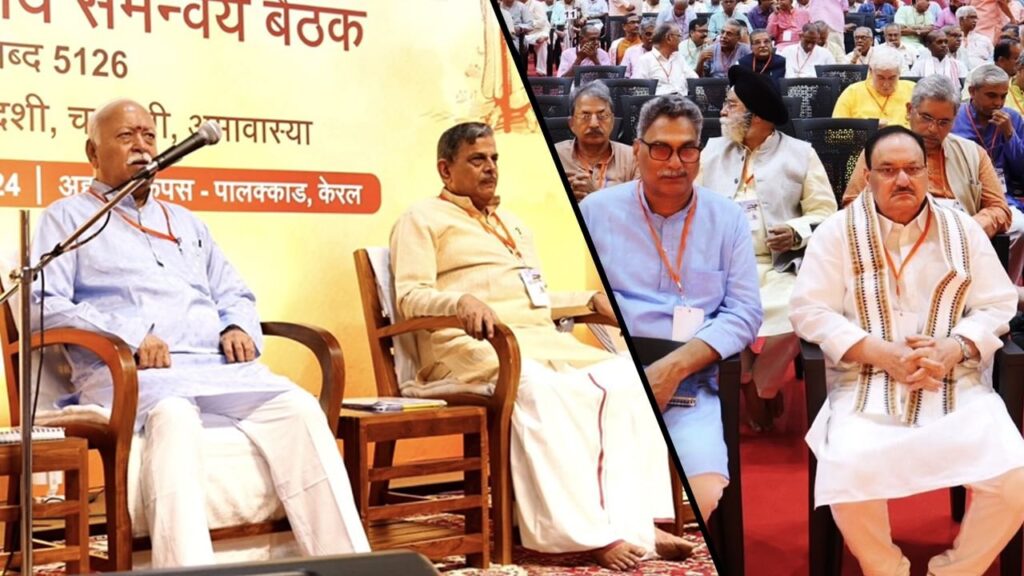The Rashtriya Swayamsevak Sangh (RSS) has initiated a three-day coordination meeting in Palakkad, Kerala, involving all its affiliated organizations. This meeting aims to address five critical questions regarding the government and affiliated organizations, while also delving into the political implications surrounding it. When questioned about the selection of Kerala as the venue, RSS spokesperson Sunil Ambekar responded, “Palakkad is a beautiful city, which is why we chose it for our meeting.”
Aside from Ambekar’s comments, speculations suggest that there are five significant statistics behind the decision to hold the meeting in Kerala, hiding the true essence of its political narrative.
Key Statistics Behind the Meeting
1. Extensive Network of RSS Branches
As of March this year, the RSS operates 5,142 branches in Kerala alone. With approximately 60,000 branches nationwide, Kerala’s contribution stands at nearly 9%. Despite its relatively small population, the rapid increase in the number of branches has captured the RSS’s attention. Recently, the RSS divided its operations in Kerala into North and South departments due to the growing number of branches. Experts indicate that such divisions occur when the RSS feels it has met its objectives in a state. The goal is to establish 8,000 branches in Kerala by next year.
2. BJP’s New Electoral Milestone in Kerala
In the recent Lok Sabha elections, the Bharatiya Janata Party (BJP) secured its first victory in Kerala, winning the Thrissur seat. Furthermore, the party came in second place in the Tiruvananthapuram constituency. This marks a historic moment as it is the first time the BJP has opened its account in Kerala since its inception, boosting the morale of both the BJP and RSS.
3. Lead in Eleven Legislative Assembly Seats
According to the Lok Sabha election results, the BJP has gained a lead in 11 Legislative Assembly seats in Kerala. This includes six in Thrissur, two in Attingal, and three in Tiruvananthapuram. Additionally, the party secured the second position in nine other constituencies, demonstrating a growing influence ahead of the state assembly elections scheduled for 2026.
4. Voter Percentage Rising Close to 20%
According to the Election Commission, the BJP garnered 19.24% of the votes in the recent Lok Sabha elections, reflecting a rise of over 3% from the 15.64% achieved in 2019. In the 2021 assembly elections, the party received only 12.41%. This surge signifies a record-breaking moment for the BJP in Kerala, posing a new challenge to retain and enhance its voter base amidst the traditional dominance of the Left and Congress parties.
5. Left Vote Migration from Bengal
While the Communist Party of India (Marxist) has historically been strong in Kerala, it has seen a vote migration to the BJP similar to the trend in West Bengal. In 2019, the BJP captured a record 18 seats in Bengal, attaining nearly 40% of the votes, which marked a 22% increase compared to 2014. With the Left’s voter share declining significantly, there are hopes among the RSS and BJP that a similar vote shift could occur in Kerala.
Topics for Discussion in the Meeting
According to the RSS, the meeting commenced with a detailed report on the assistance provided by RSS workers during the recent floods in Wayanad. Prominent figures, including RSS Chief Mohan Bhagwat, Dattatreya Hosabale, BJP President JP Nadda, and organizational secretary BL Santosh, alongside around 300 officials from various organizations, are in attendance. The agenda includes discussions on critical political and social issues, with plans to address matters pertaining to caste alignments and electoral strategies.
With the backdrop of increasing political competition, this meeting is crucial for the RSS and BJP as they strategize for upcoming elections in the region, aiming for a stronger foothold in a state that has predominantly leaned towards the Left and Congress over the past decade.
